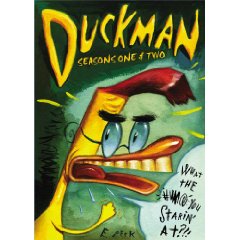 Animation fans rejoice, for Duckman, the irreverent animated show that aired on USA in the ’90s has finally arrived on DVD. CBS/Paramount has released all four seasons of the groundbreaking television series on two excellent box sets that are available now. Anyone who is a fan of Family Guy or Adult Swim should rush out and purchase these beautifully made DVDs — they include all 70 episodes of the cult show that starred Jason Alexander as Duckman, a lazy, sarcastic, obnoxious private eye who lives with his dead wife’s sister, his two kids, and his flatulent, mute mother-in-law.
Animation fans rejoice, for Duckman, the irreverent animated show that aired on USA in the ’90s has finally arrived on DVD. CBS/Paramount has released all four seasons of the groundbreaking television series on two excellent box sets that are available now. Anyone who is a fan of Family Guy or Adult Swim should rush out and purchase these beautifully made DVDs — they include all 70 episodes of the cult show that starred Jason Alexander as Duckman, a lazy, sarcastic, obnoxious private eye who lives with his dead wife’s sister, his two kids, and his flatulent, mute mother-in-law.
Duckman premiered in March of 1994, and although it was never able to achieve the type of fame The Simpsons did (due in part to having its time slot changed several times), it did last for four seasons and was nominated for three Emmys. Controversial at the time for its dark, adult themes and overt sexual references, Duckman was a show that broke new ground in television animation. Never intended for children, it instead was an attempt to capture the twisted and funny going on’s that took place in the head of creator Everett Peck and the show’s producers/head writers, Jeff Reno and Ron Osborn. In addition, the show was co-produced and animated by Klasky Csupo, the eccentric company responsible for the original Simpsons shorts (and the first three seasons), as well as Rugrats, The Wild Thornberrys and several other Nickelodeon shows. The heavily European influence that was the Klasky Csupo trademark look fused well with Peck’s illustration style creating an imaginative, offbeat and colorful world.
 As the DVDs reveal, Duckman was a fast-paced, biting comedy that took on the sacred cows of the establishment and made pointed social commentary about society, the media in particular. Alexander was perfectly cast to take on the rat-a-tat-tat pace of dialogue which required him to go from manic, over-the-top screaming to quiet, reflective monologues at a moment’s notice. Playing against Alexander’s brilliance are veteran voiceover actor Gregg Berger as Cornfed, Duckman’s no nonsense partner (he’s a pig) and Nancy Travis as Bernice, the identical twin sister of Duckman’s dead wife. The show was also significant for attracting numerous big-name guest stars, including Ben Stiller, David Duchovny, Carl Reiner and Brendan Fraser.
As the DVDs reveal, Duckman was a fast-paced, biting comedy that took on the sacred cows of the establishment and made pointed social commentary about society, the media in particular. Alexander was perfectly cast to take on the rat-a-tat-tat pace of dialogue which required him to go from manic, over-the-top screaming to quiet, reflective monologues at a moment’s notice. Playing against Alexander’s brilliance are veteran voiceover actor Gregg Berger as Cornfed, Duckman’s no nonsense partner (he’s a pig) and Nancy Travis as Bernice, the identical twin sister of Duckman’s dead wife. The show was also significant for attracting numerous big-name guest stars, including Ben Stiller, David Duchovny, Carl Reiner and Brendan Fraser.
The first set compiles seasons 1 & 2 and includes running commentary over the first episode by Peck and Alexander, as well as “What the Hell Are You Starin’ At,” a great documentary short about the Duckman featuring interviews with all of the main players. The second box collects all of seasons 3 & 4 (48 episodes in all). Extras include footage of the original pitch pilot that Gabor Csupo funded to get Duckman up and running.
Long before Family Guy and Adult Swim were mainstays in popular culture, Duckman was laying the groundwork for adult themed animated series. Thankfully, CBS/Paramount recognizes the achievements of the show and has created these handsomely packaged collections.
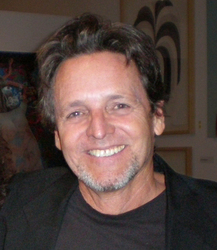 I had the opportunity to interview Everett Peck upon the release of DVDs. If you happen to watch the Duckman interviews on the DVDs, Peck comes across as easygoing and charming. This is no act. Peck is down-to-earth and perhaps one of the most likable people you’ll ever meet. He began his career as graphic artist in 1974 and quickly earned national and international recognition. His illustration work has spanned all areas of illustration including comic books, cartoons, editorial, advertising, institutional, and book illustration. Some of his clients have been Time Magazine, Playboy, The New Yorker, Honda, and Nike. In the early ’90s, he was recruited by Gabor Csupo to work at Klasky Csupo. Thus began his career in animation, a love of his from childhood.
I had the opportunity to interview Everett Peck upon the release of DVDs. If you happen to watch the Duckman interviews on the DVDs, Peck comes across as easygoing and charming. This is no act. Peck is down-to-earth and perhaps one of the most likable people you’ll ever meet. He began his career as graphic artist in 1974 and quickly earned national and international recognition. His illustration work has spanned all areas of illustration including comic books, cartoons, editorial, advertising, institutional, and book illustration. Some of his clients have been Time Magazine, Playboy, The New Yorker, Honda, and Nike. In the early ’90s, he was recruited by Gabor Csupo to work at Klasky Csupo. Thus began his career in animation, a love of his from childhood.
Peck continues to work in animation. His most recent series, Squirrel Boy, aired on Cartoon Network for 2 seasons from 2006-2007.Á‚ In addition to developing new animated programs, Peck is still creating new artwork, some of which can be seen at his website, everettpeck.com
We began our conversation with Everett explaining the origin of Duckman.
Everett Peck: I was doing some freelance projects with Gabor (Csupo); I’d been doing them for a year or so before (Duckman). We’d been doing stuff for Sesame Street and some random animation projects when he asked me if I had any ideas for animated projects. I told him “Well I am working on a comic book idea called Duckman.” I brought in the material I had so far and he liked it. So we decided to go in together and do it as an animated project. I was in the process of working on the comic so, it kind of happened simultaneously, but we started working on the animation project a little before the publication of the comic.
Popdose: How many comics were there?
I only did one comic, for Dark Horse.
How long did it take from these initial conversations to when it finally became a series?
Oh, it was quite a while. We had put together some pitch materials, but at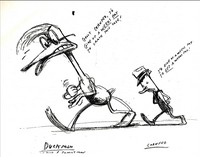 that time there really wasn’t much going on in prime time animation. The Simpsons had just kind of gotten started, but the jury was still out on the show with whether it would last or not. Anyway, we showed the pitch materials to few places with only minor interest. Finally, Gabor said he wanted to go ahead and self finance a pilot through Klasky Csupo. That took about six months to get finished, and (the pilot’s length) is about twenty minutes and we used that as a selling tool. After the pilot was completed, we had quite a bit of interest. We went to FOX and USA Network because they were both looking for animated material and FOX offered us a two script deal and USA offered us thirteen episodes on the air. We opted to go with USA.
that time there really wasn’t much going on in prime time animation. The Simpsons had just kind of gotten started, but the jury was still out on the show with whether it would last or not. Anyway, we showed the pitch materials to few places with only minor interest. Finally, Gabor said he wanted to go ahead and self finance a pilot through Klasky Csupo. That took about six months to get finished, and (the pilot’s length) is about twenty minutes and we used that as a selling tool. After the pilot was completed, we had quite a bit of interest. We went to FOX and USA Network because they were both looking for animated material and FOX offered us a two script deal and USA offered us thirteen episodes on the air. We opted to go with USA.
Yeah, obviously.
So, the time I started developing the material with Gabor and to the execution of the pilot, it was a little over a year.
Were you interested in animation before you started working with Klasky Csupo?
When I was a kid what I really wanted to do was be involved with animation. But as I got into high school and college, there wasn’t really anything going on in animation anymore. I always had an interest, particularly in high school, in illustration so that’s what I majored in at college and I went to work as an illustrator. I had done a few random design projects (for animation), but I didn’t really into animation until I’d been an illustrator for about twenty years. So that’s how Gabor knew my work. When he learned I was interested in designing for animation he and I worked on some projects together.
When it came to recording the episodes of Duckman, who handled directing the actors? Was it you and Ron and Jeff, or was there a voice director?
It was mostly Ron and Jeff and I. Usually the writer who wrote that particular episode was in the booth with us. We didn’t have a voice director. We had a casting director, Barbara Wright, but we directed the sessions ourselves.
Talk a little bit about the casting for Duckman. What a great cast. How did they come together?
On the spec pilot we cast Ronnie Schell as the voice of Duckman. He wasn’t too bad, actually, but it was a very short list of people to get the pilot done. Gregg Berger, though, was Cornfed and he always remained Cornfed.
Was Nancy Travis in the pilot?
Nancy was not in the pilot. The only person who continued from the pilot was Gregg. When we got the USA pickup, we began casting in all seriousness for (the character of) Duckman. Gregg just fell in place, but we listened to probably seventy different people, at least (for Duckman) and I was burned out because I’d listened to so many voices. One afternoon I was sitting in Gabor’s office with Marv Newland, who directed the first episode (“I, Duckman”-ed). He’s an old friend of mine. We were listening to a few (auditions) and Jason (Alexander) came up. Marv said “Hey, there’s you guy.” And I thought, “Yeah, he sounds pretty good.” (He chuckles) At that time, Seinfeld was on the air, but it was kind of struggling along in its second season; it didn’t bust out yet as a mega hit. Jason was still fairly unknown at that time. He was able to do the rapid fire delivery the way the show was written, had a great sense of comic timing, and a good quality to his voice. Plus he sounded great with Gregg.
And when the show had those emotional moments where Duckman gets reflective, he really hits those well. You actually feel sorry for Duckman.
Jason’s got good range and was able to do anything, really. He did a lot of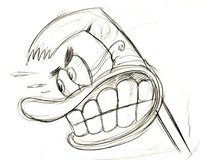 ad-libbing and things that we went ahead and used in some of the shows. He was so great at that. He was great to work with and really got a handle on the character. Nancy Travis was someone that Jeff and Ron knew and worked with previously. She was great. Gabor was a big fan of Frank Zappa’s and we went over to his place a couple of times when we would to talk to him about doing music. He was interested in animation, and actually pitched a couple of projects to Klasky Csupo, nothing that worked out, but Dweezil Zappa was interested in doing some voice work and I thought, “Okay, we’ll see him.” Gabor brought him in and Dweezil did great.
ad-libbing and things that we went ahead and used in some of the shows. He was so great at that. He was great to work with and really got a handle on the character. Nancy Travis was someone that Jeff and Ron knew and worked with previously. She was great. Gabor was a big fan of Frank Zappa’s and we went over to his place a couple of times when we would to talk to him about doing music. He was interested in animation, and actually pitched a couple of projects to Klasky Csupo, nothing that worked out, but Dweezil Zappa was interested in doing some voice work and I thought, “Okay, we’ll see him.” Gabor brought him in and Dweezil did great.
Yeah, he’s really great.
So that’s how that fell in place.
Speaking of Frank Zappa, did he just do the theme song or did he compose music for the show as well?
As it turned out, he was most involved with the first season. We did use some of the music he’d done for the first season, but after that, it was mostly handled by people who had worked with him or had been his assistants. He was really more of an inspiration for the music than actually doing a ton it. But it was great to meet with him. He was definitely involved; he definitely liked the project and was a guiding hand in the music in the early stages. (Zappa died of cancer in December of 1993.)
Wasn’t his music a reason for the hold-up getting the series on DVD?
Yeah. The deal that had been worked out with Frank’s wife and their company was pretty generous, to say the least, when it came to the release of the DVD. And I only had two comments: 1) How was that justified, and 2) Who is their lawyer?
(We both laugh)
I’d actually been trying to get the DVD released for some time and I’d worked with Paramount and their domestic release division and we were pretty close when most of Paramount’s catalog was bought out by CBS. So (the initial deal) all fell apart. Fortunately, I had my agent check into CBS and he found Ken Ross, who was the head of domestic video releases for CBS in New York. I started talking to him and we struck up a relationship and he was totally on board with (getting the DVD’s out). So he picked up the ball and ran with it and got the DVDs made.
Everything in the packaging is really beautiful. They did a really nice job. It was interesting to see the original pilot Csupo did that is included n the second box set.
That’s right. We have part of it on that set. Well most of it, but it’s not complete. But it gives an idea of what we did with it initially.
When it was on the air, the show seemed to switch time slots a lot. How frustrating was that?
Oh, yeah. The show was totally mishandled. Sometimes I think about how different things would have been if FOX had picked it up and supported it. Of course, on the other side, we had a lot of freedom in what we did with USA, they weren’t very intrusive. Paramount’s head of television was very supportive of the show and was just great to us and so we had a lot of creative freedom with USA and Paramount. That was the positive side. The negative side was we only went four seasons and it was kind of oddly”¦ it wasn’t really promoted much up front and then they kept switching time slots. As a result, we really weren’t able to build a solid viewership from that side. It sort of developed a cult following. People were willing to search through and find it all the time.
I was looking through the number of episodes you did, and in seasons 3 and 4 you did 48 episodes. Nowadays that’s unheard of for a prime-time cable show. A cable season is 13 episodes.
We had a total of 70 episodes and they were broken into three 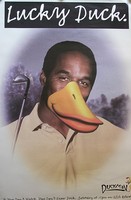 separate orders and eventually divided up into the four seasons. After the second set of episodes, we thought that was it, and then we got the third set. In the transition between the second and third season, USA did a promo campaign and they put some effort in to promote it a bit. Unfortunately it was too little too late. In the second DVD box set, there are some posters and things that were done by an agency working with Paramount that are cool. So they made an effort to promote it a little bit. But again, it was not enough. The fact that it kept getting moved around made it difficult for it to find a following. We always maintained a core group, but we couldn’t really grow. It was also an odd time for animation, too. The Simpsons were there, but there was this rash of shows that kind of came up along with Duckman. Hanna-Barbera had a show, Fish Police.
separate orders and eventually divided up into the four seasons. After the second set of episodes, we thought that was it, and then we got the third set. In the transition between the second and third season, USA did a promo campaign and they put some effort in to promote it a bit. Unfortunately it was too little too late. In the second DVD box set, there are some posters and things that were done by an agency working with Paramount that are cool. So they made an effort to promote it a little bit. But again, it was not enough. The fact that it kept getting moved around made it difficult for it to find a following. We always maintained a core group, but we couldn’t really grow. It was also an odd time for animation, too. The Simpsons were there, but there was this rash of shows that kind of came up along with Duckman. Hanna-Barbera had a show, Fish Police.
Oh yeah, all of those shows tanked. Capital Critters was one.
Yeah, Capital Critters, they all failed. And so, it was a different climate for animation. No one would have dreamed that The Simpsons would be coming up on 20 years.
No kidding.
It was all up in the air. Plus, Duckman was always a bit of an odd show in that it was the only true animated adult show. We never professed to be for kids. It was always a grown-up show.
Your main character was always smoking.
Yeah, smoking, and there were a lot of sexual references and things like that. It’s a little more common now in some of the shows. But at that time, you really didn’t have that in The Simpsons, and this was way before Family Guy and all that. It was kind of an odd duck.
I think Duckman really would have benefited from TiVo.
Absolutely.
Viewers would have been able to find it, tape and watch it whenever they wanted.
Yeah, it was all pre”¦ pre-everything.
Touching on Family Guy and even Adult Swim, Duckman was ahead of its time. It was the kind of show that, now, you would see on Adult Swim or possibly on FOX after Family Guy. It seems like what they’re doing is what you already did in the ’90s.
It’s funny — I hadn’t really looked at Duckman all that much in years until we started to put together the DVDs. I pulled out a lot of episodes and started looking at them and I thought, “Wow, there’s a lot of stuff that we did, cutaways and pop culture references and stuff like that, which are, you know, the staple of something like Family Guy.” Plus, one thing that I always liked about the show that I don’t see much in any contemporary animation is we would have, occasionally, an episode where we would cut to live action or would have a live action segment. One of my favorites is when Duckman is made into a movie of the week, and it’s all live action (“Papa Oom M.O.W. M.O.W.,” Season 2.)
That’s the one where Charles Shaughnessy (The Nanny) plays Duckman.
Yes, Duckman approves Charles Shaughnessy cast as himself in this movie of the week. He sees himself as that kind of person. And Gregg Berger plays Cornfed in the live action segment. But instead of the guiding moral compass of the office, he’s a complete drunk.
(We laugh)
And we had a Star Trek segment we did where Leonard Nimoy wakes up at the end and the episodes all been a horrible nightmare (“Where No Duckman Has Gone Before,” Season 4-ed). There were also some game show sequences where we’d cut to live action. That’s the kind of stuff we did fairly frequently. It was fun to see that stuff. Another thing, animation today, in particular prime time animation, has a real consistency to it and it all tends to be fairly flat. When I went to look at these Duckman episodes, they almost looked rich compared to contemporary animation. At the time I remember being slightly disappointed in that I didn’t feel I could get the kind of textures and shadows and gradations and the depth to Duckman that I wanted at the time. Of course, now I could do all of that with the digital tools that are available.
There’s a lot of activity going on in the background, and in the frame, that if you watch an episode two or three times you catch something you missed the first time.
That was always something I wanted to do. You have fun characters and great stories, but I also wanted to have it look interesting and have some depth and dimensional elements to the world. That was always important to me.
Well, the DVDs look great and the sound quality is awesome; you must be pretty happy. Hopefully the show will find a new audience.
It’s nice to get it out there. Like I said, looking back on it I feel we did a great job on Duckman, and hopefully, people will enjoy it.
Duckman Seasons 1 & 2 and Seasons 3 & 4 (CBS/Paramount) are available through Amazon.




Comments